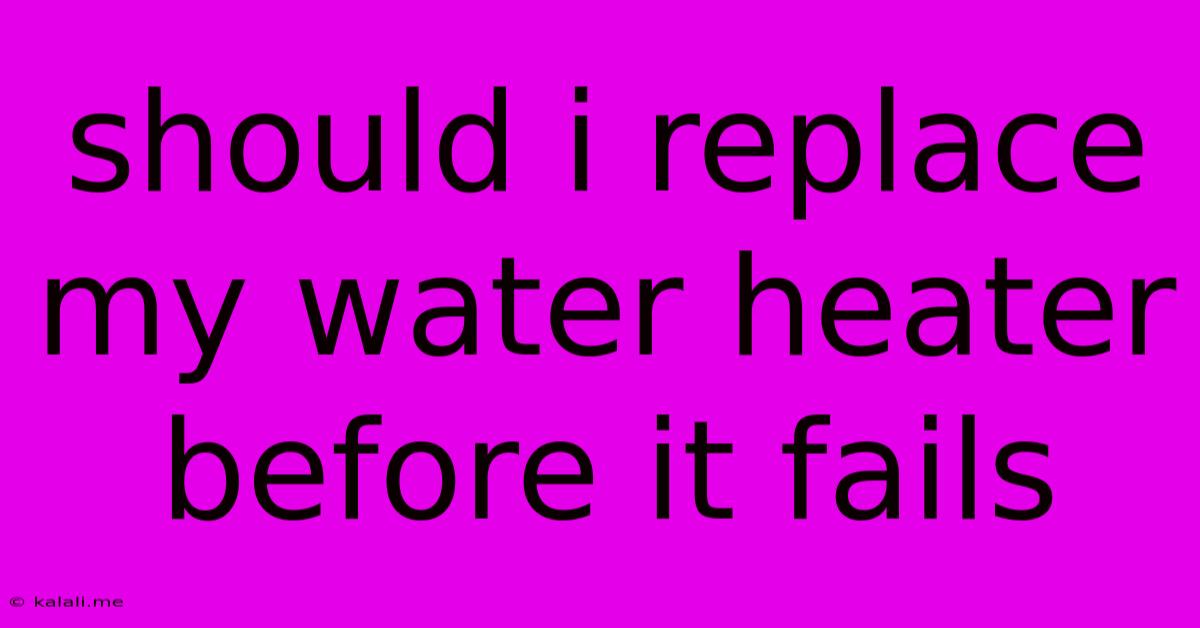Should I Replace My Water Heater Before It Fails
Kalali
Jun 08, 2025 · 3 min read

Table of Contents
Should You Replace Your Water Heater Before It Fails? A Proactive Approach to Home Maintenance
Replacing a water heater is a significant home expense, often unexpected and inconvenient. Many homeowners wait until their water heater springs a leak or completely fails before considering a replacement. However, a proactive approach might save you money and stress in the long run. This article explores the pros and cons of replacing your water heater before it breaks down, helping you decide what's best for your situation.
Is it worth replacing your water heater before it breaks? The short answer is: it depends. Several factors influence the decision, including the age of your water heater, its current condition, the type of water heater you have, and your budget. Let's delve into the details.
Signs Your Water Heater Needs Replacing Soon
Before deciding whether to replace proactively, assess your current water heater's health. Several warning signs indicate it's nearing the end of its lifespan:
- Age: Most water heaters last 8-12 years. If yours is approaching this age, it's a strong indicator that a replacement is on the horizon. Regular maintenance can extend its life, but eventually, age catches up.
- Strange Noises: Loud rumbling, banging, or popping sounds often signal sediment buildup or internal component failure.
- Leaks: Even small leaks should be addressed immediately. A significant leak can cause extensive water damage and a costly repair or replacement.
- Reduced Hot Water: If you consistently run out of hot water before it's reheated, it could mean your tank is failing or the heating element is malfunctioning.
- Rust or Corrosion: Check for rust or corrosion around the tank, especially near the bottom. This is a major red flag indicating potential failure.
- Increased Energy Bills: An older, inefficient water heater will significantly increase your energy consumption, leading to higher bills. Replacing it with a more energy-efficient model can offset the initial cost over time.
The Advantages of Proactive Replacement
Replacing your water heater before failure offers several key advantages:
- Avoid Inconvenient Downtime: A sudden water heater failure leaves you without hot water—a major disruption to daily life. Proactive replacement allows you to schedule the installation at your convenience, minimizing disruption.
- Prevent Water Damage: A burst tank can cause extensive and costly water damage to your home. Replacing the unit beforehand prevents this potential disaster.
- Potential Cost Savings: While replacing a functioning water heater seems expensive upfront, it can save money in the long run by avoiding emergency repairs and water damage costs.
- Improved Energy Efficiency: Newer water heaters are much more energy-efficient than older models. Switching to a newer model can significantly reduce your energy bills. Consider models with features like tankless technology or high Energy Factor (EF) ratings.
- Peace of Mind: Knowing your water heater is new and reliable provides peace of mind, reducing the worry of a sudden breakdown.
The Disadvantages of Preemptive Replacement
Of course, proactive replacement isn't without drawbacks:
- Upfront Cost: The most significant disadvantage is the initial expense. Water heaters can be costly, requiring a substantial investment.
- Disposal Costs: Proper disposal of an old water heater is important, as they contain hazardous materials. There may be associated fees for disposal.
Making the Right Decision
Ultimately, the decision to replace your water heater proactively hinges on several factors:
- Your Budget: Can you afford the upfront cost of replacement? Consider financing options if necessary.
- The Age and Condition of Your Water Heater: A clearly aging or malfunctioning unit is a stronger candidate for replacement.
- Your Risk Tolerance: Are you willing to risk a sudden failure and potential water damage?
- Energy Efficiency: The potential energy savings from a newer, more efficient model should be factored into your decision.
By carefully considering these factors and evaluating the signs of impending failure, you can make an informed decision about whether to proactively replace your water heater, ensuring reliable hot water and protecting your home from costly damage. Consulting a qualified plumber can provide valuable insights and help you choose the best option for your needs.
Latest Posts
Latest Posts
-
How Do You Pluralize A Name Ending In S
Jun 08, 2025
-
How To Remove Tub Spout With Diverter
Jun 08, 2025
-
Minecraft Disable Pause On Lost Focus
Jun 08, 2025
-
15 Amp Circuit Breaker Keeps Tripping
Jun 08, 2025
-
How To Keep Grass Out Of Flower Beds
Jun 08, 2025
Related Post
Thank you for visiting our website which covers about Should I Replace My Water Heater Before It Fails . We hope the information provided has been useful to you. Feel free to contact us if you have any questions or need further assistance. See you next time and don't miss to bookmark.